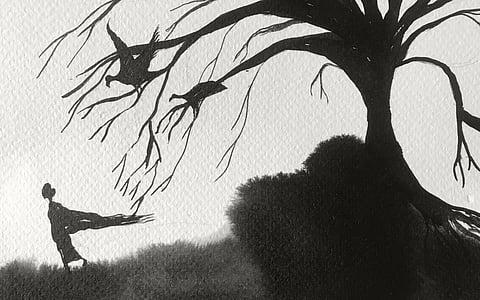I watch the milk in the aluminium pot froth into a tea-specked mountain, and turn off the flame. Then I pour it through a mucky strainer with a plastic orange handle. Mother never threw a thing. Looking around I see everything as it was the last time I was home, two years ago; the stained cutting board with juices from vegetables and meat etched deeply into its grooves, the dented steel tumblers that have lost their shape, the plastic dish-rack whose original colour is long forgotten beneath hardened grime. Now that she's gone, I can throw all these things and not worry about her yelling and insisting that there is still more life left in them.
Father is sitting on the worn-out cot, with its frayed lattice coir base, ready to give way any day. He hasn't changed much either. He is smoking a beedi slowly. His dark leathery skin hangs, making him look like a large bag that is only half packed. Without glancing up at me, he reaches out mechanically and takes the glass from my hand. Our fingers graze lightly, and I watch his bloodshot eyes for a reaction or acknowledgement, feeling pathetic for wanting what will never come.

